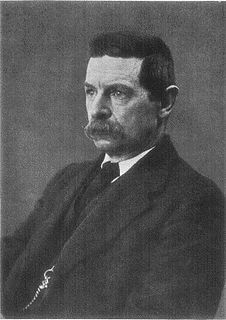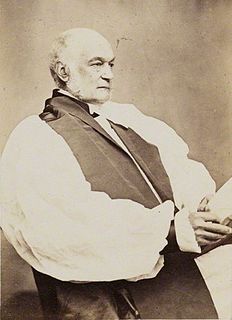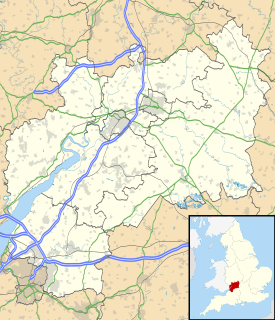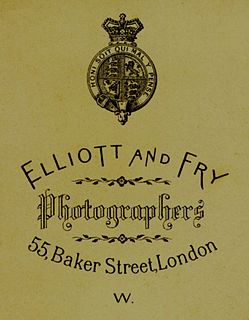
Edward Reynolds Pease was an English writer and a founding member of the Fabian Society.

George Moberly was an English cleric who was headmaster of Winchester College, and then served as Bishop of Salisbury from 1869 until his death.
J. S. Fry & Sons, Ltd. better known as Fry's, was a British chocolate company owned by Joseph Storrs Fry and his family. Beginning in Bristol in the 18th century, the business went through several changes of name and ownership, becoming J. S. Fry & Sons in 1822. In 1847, Fry's produced the first solid chocolate bar. The company also created the first filled chocolate sweet, Cream Sticks, in 1853. Fry is most famous for Fry's Chocolate Cream, the first mass-produced chocolate bar which was launched in 1866, and Fry's Turkish Delight, launched in 1914.

Frenchay is a village and suburb of Bristol, England, to the north east of the city, but located mainly in South Gloucestershire and the Civil Parish of Winterbourne.

Sir Joseph Whitwell Pease, 1st Baronet was a British Liberal Party politician who sat in the House of Commons from 1865 to 1903.
Joseph Storrs Fry (1767–1835) was an English chocolate and confectionery manufacturer and a member of the Fry Family of Bristol, England.

Joseph Storrs Fry was a member of the Bristol Fry family, head of the family chocolate firm of J. S. Fry & Sons and a philanthropist.
The Pease family is an English and mostly Quaker family associated with Darlington, County Durham, and North Yorkshire, descended from Edward Pease of Darlington (1711–1785).

Norah Lillian Fry (1871–1960) was a member of a Bristol Quaker Fry family of the J. S. Fry & Sons company. She was an advocate and campaigner for disabled children and those with learning difficulties and in 1918 became the first female councillor in Somerset.
The Fox family of Falmouth, Cornwall, UK were very influential in the development of the town of Falmouth in the 19th century and of the Cornish Industrial Revolution. In the 18th and 19th centuries, many of them were members of the Religious Society of Friends (Quakers).

Sir Theodore Fry, 1st Baronet was an English businessman and Liberal Party politician who sat in the House of Commons from 1880 to 1895.

William Fowler was an English Liberal politician who sat in the House of Commons in two periods between 1868 and 1885.

Lewis Fry was a Quaker, lawyer, philanthropist and a Liberal and later Liberal and Unionist politician who sat in the House of Commons in three spells between 1878 and 1900.

Francis Fox Tuckett FRGS was an English mountaineer. He was vice-president of the Alpine Club from 1866 to 1868, and a Fellow of the Royal Geographical Society.
Joseph Fry was a tea dealer and an unsuccessful banker. He was the husband of the prison reformer Elizabeth Fry.

Elliott & Fry was a Victorian photography studio founded in 1863 by Joseph John Elliott and Clarence Edmund Fry. For a century the firm's core business was taking and publishing photographs of the Victorian public and social, artistic, scientific and political luminaries. In the 1880s the company operated three studios and four large storage facilities for negatives, with a printing works at Barnet.
Joseph Fry, was an English type-founder and chocolate maker and founder of the Bristol branch of the Quaker Fry family. He was the eldest son of John Fry of Sutton Benger, Wiltshire, author of ‘Select Poems,’ 1774, 4th edition, 1793. He was educated in the north of England, and afterwards bound apprentice to Henry Portsmouth of Basingstoke, an eminent doctor, whose eldest daughter, Anna, he afterwards married. He was the first member of his family to settle in Bristol, where he acquired a considerable medical practice, and ‘was led to take a part in many new scientific undertakings’.
Francis Fry (1803–1886), was an English businessman and bibliographer.
Sir Geoffrey Storrs Fry, 1st Baronet was private secretary to prime ministers Bonar Law and Stanley Baldwin, and a member of the Fry family.
Sophia Fry later Lady Fry was a British political activist, notable for founding the Women's Liberal Federation.












